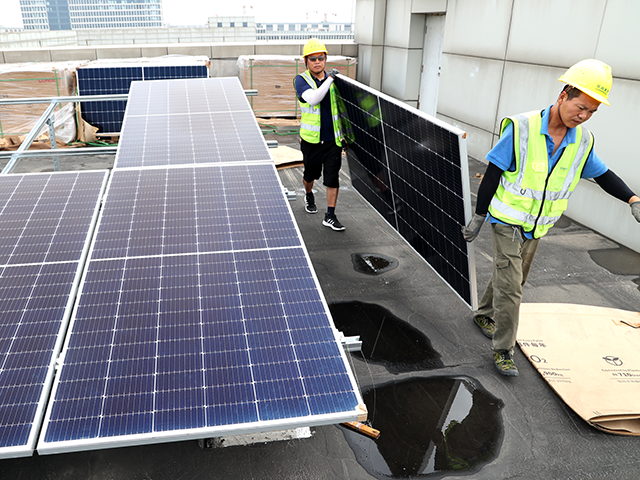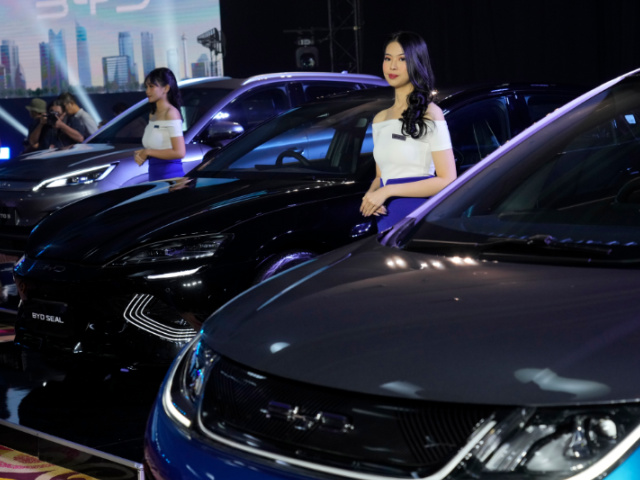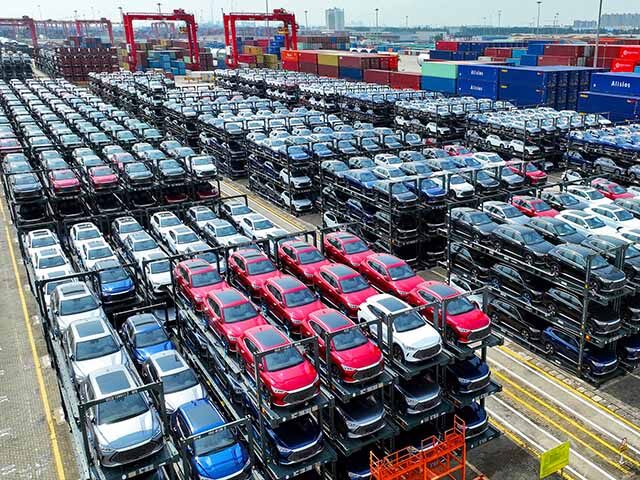China’s effort to jump-start its economy by exporting a vast quantity of cheap manufactured products is running into unexpected resistance from the United States, European Union, and even developing nations such as Brazil and Mexico. All of these nations are concerned with market disruptions caused by a tidal wave of Chinese imports, as happened during the “China Shock” two decades ago.
China Shock 2.0 includes a torrent of cheap solar panels, electric vehicles, and lithium-ion batteries, which dictator Xi Jinping has identified as the “New Three” industries that will revive the flagging Chinese economy.
“In particular, China’s manufacturers are pumping out so many solar panels that the resulting global glut and price crash are prompting people to line their garden fences with the once-prized product,” Business Insider noted on Thursday.

Workers install solar panels on the roof of factory buildings at a small and medium-sized enterprises park on July 5, 2022, in Lianyungang, Jiangsu Province, of China (Photo by VCG/VCG via Getty Images).
The Wall Street Journal (WSJ) added that emerging economies are worried about China dumping huge quantities of steel, ceramics, and chemicals into their markets.
“India alone has opened antidumping probes into everything from Chinese-made bolts and screws to glass mirrors and vacuum-insulated flasks. Argentina is investigating Chinese elevators. The U.K. is scrutinizing excavators and electric bicycles,” the WSJ said.
The first China Shock saw manufacturing bases in the U.S. and Europe crumble under the blizzard of cheap Chinese goods, destroying thousands of jobs as other countries found themselves unable to compete with China’s incredibly cheap labor and minimal regulatory overhead.
China Shock 2.0 comes at a time of global market unrest from the Russian invasion of Ukraine, lingering hangovers from the pandemic lockdowns, and a surprisingly persistent “de-risking” push by multinational corporations to find alternative manufacturing sources instead of putting all their eggs in China’s basket.
China, meanwhile, is eager to push back against de-risking, minimize the dangers of its property sector collapsing, and secure a dominant position in the New Three green industries by pumping huge state subsidies and loans into manufacturing firms.
Unexpectedly weak domestic demand from nervous Chinese consumers made the export surge even larger. For example, the U.K. is currently investigating China for dumping heavily subsidized excavators into its market, forcing domestic manufacturers to sell their own machinery at a loss. One reason China had so many excavators to sell at bargain-basement prices is that its domestic real estate and construction industries have dramatically contracted.
Another troubling sign is the enormous reduction of Chinese purchases of luxury goods from overseas, including prestige brands whose goods cannot be easily duplicated with cheap Chinese labor.
Everything from Gucci bags to Swiss watches is selling far more slowly in China than anticipated after the coronavirus lockdowns were lifted. French luxury brand Kering SA announced a stunning loss of $9 billion in Chinese market value for the last quarter, while Swiss designer watches are down 25 percent. If wealthy Chinese are unwilling to buy those most desirable of imported products, they probably will not buy as many domestically produced goods, either, meaning even more cut-rate exports will flow overseas.
Economists told the WSJ that China may have miscalculated because developed nations are taking steps to control the flood of cheap goods from China, while developing nations simply lack the capacity to buy everything Beijing wants to sell them.
The labor movement in countries like Chile is already complaining about Chinese companies “dumping” products and distorting their markets. Brazil’s chemical factories are operating at just 64 percent capacity, thanks to Chinese dumping, and if they reduce their output any more, thousands of jobs could disappear. Union leaders are demanding higher tariffs and import quotas as a remedy.
China is protesting against some of these measures, although its complaints have been mostly directed at the United States, possibly because Beijing still absurdly postures as a “developing nation” and is reluctant to antagonize the emerging economies it wants to bring more firmly into its orbit.
On the U.S. side, the most obvious signs of China Shock concern are in the auto industry, which is plainly terrified about a potential deluge of cheap Chinese electric vehicles (EV). American automakers devoured billions in government subsidies and devoted huge amounts of their production capacity to create expensive EVs that American consumers are not interested in buying, and their sunk costs could be quickly turned into cement overshoes if China sweeps in with snappy little EVs that sell for half the price.

Models stand near BYD electric cars on display, from left, Atto 3, Seal and Dolphin on Thursday, January 18, 2024 (AP Photo/Achmad Ibrahim).
The Economist noted there is plenty of Chinese foul play for American auto companies (and, perhaps more importantly, their incredibly powerful unionized workforces) to complain about:
Since the launch of its “Made in China” agenda in 2014, China has brazenly disregarded global trading rules, showering handouts on its carmakers. It is hard to be precise about the value of the underpriced loans, equity injections, purchase subsidies and government contracts Chinese firms enjoy. But by one estimate, total public spending on the industry was in the region of a third of EV sales at the end of the 2010s. These subsidies come on top of the ransacking of technology from joint ventures with Western carmakers and Western and South Korean battery-makers.
The Economist, nevertheless, thought that “locking out Chinese cars would be a mistake” because China can supply the “cheap green vehicles” that environmentalists want to force American and European consumers to drive.
China’s BYD displaced Tesla as the world’s top seller of EVs this year, and BYD’s cheapest model costs less than a third of the cheapest Tesla car. The Economist suggested Americans console themselves over the impending loss of the U.S. car industry by thinking about all the money they will save by buying $12,000 EVs from Beijing.
Union leaders and auto executives had better understand that green lawmakers are quite willing to sacrifice their jobs and industries to make the compulsory electric vehicle transition happen, and China is the only source of EVs that cost anywhere near the sticker price of the internal combustion cars lawmakers wish to phase out.

COMMENTS
Please let us know if you're having issues with commenting.